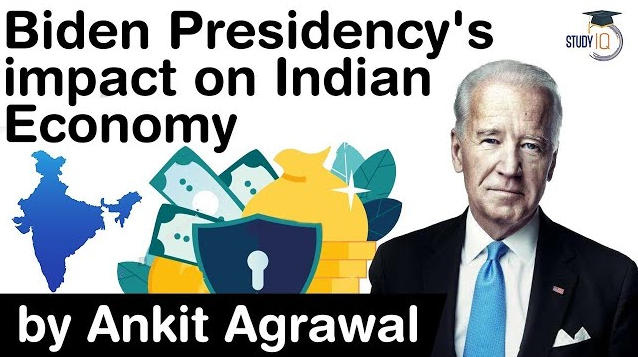Table of Contents
Introduction
- In choosing Biden over Trump, the American voters have most likely changed the course of the global economy.
- This is why everyone has been so keenly following the twists and turns of the presidential elections in the US.
- There are several ways in which the US economy, its health and the policy choices of its government affect India.
Trade surplus
- For one, the US is one of those rare big countries with which India enjoys a trade surplus. In other words, we export more goods to the US than what we import from it.
- Over the past 20 years, India has always had a trade surplus with the US.
- The trade surplus has widened from $5.2 billion in 2001-02 to $17.3 billion in 2019-20.
- Trade surplus had peaked at $21.2 billion in FY18 (2017-18) and has moderated to some extent.
- In 2019-20, India exported goods worth $53 billion to the US — that’s roughly 17% of all Indian exports that year and
- Imported goods worth $35.7 billion in return — that’s roughly 5% of all Indian imports.
- Apart from trade in goods, India accounts for nearly 5% of USA’s services imports from the World.
- Between 2005 and 2019, US services imports from India have grown at a compounded annual growth rate of 14%.
- In 2019, US imports of services from India were $29.7 billion.
FDI & FPI
- Beyond trade, over the past two decades, the US is the fifth-biggest source for Foreign Direct Investment (FDI) into India.
- Of the total $476 billion FDI that has come in since April 2000, the US accounted for $30.4 billion roughly5% directly.
- Only Mauritius, Singapore, Netherlands, and Japan have invested more FDI since 2000.
- The US also accounts for one-third of all Foreign Portfolio Investments into India.
- FPI data shows that, as of September 2020, total Assets Under Custody were Rs 33.22 lakh crore and the US accounted for Rs 11.21 lakh crore of this amount.
Impact on trade
- In the Trump worldview, trade was a zero-sum game.
- In other words, a country had to lose for another to gain.
- Of course, that is not the case most of the time because more often than not, trade is mutually beneficial.
- On trade, Biden is likely to be less obtrusive than the current Trump administration.
- Under a Biden administration, India’s trade with the US could recover from the dip since 2017-18.
Moving away from protectionists
- A Biden presidency may also see a renewed push towards a rules-based trading system across the world — instead of outright ad-hocism as was the case under Trump,
- As well as a move away from the protectionist approach that has been getting strong across the world.
- Combined with the control of Covid infections and the economic recovery,
- The US could yet again provide a growth impulse to the global economy that countries such as India need to boost their exports and grow.
Policy concerns
- How a US President looks at the H1-B visa issue, affects the prospects of Indian youth far more than the youth of any other country.
- Under President Trump, who severely curtailed the visa regime, thanks to his policy of “America First”,
- India had suffered the most.
- That could change under Biden, who is unlikely to view immigrants and workers from India with Trump-like suspicion.
- Similarly, India’s exclusion from the US’ Generalized System of Preference could come up for reconsideration under Biden.
Other issues
- Other points of contention between India and US — such as the tricky issue of data localisation or capping prices of medicines and medical devices,
- Have a better chance of getting towards a resolution as we move away from the radical approach of President Trump to the pragmatism of a Biden presidency.
Iran factor
- Under the Trump administration, the US sanctions on Iran severely limited India’s sourcing of cheap crude oil.
- For an economy such as India, which needs a regular supply of cheap oil to grow fast,
- A normalisation of US-Iran relationship (and lifting of sanctions) would be more than useful.
- Last but not the least, Biden has promised to rejoin the Paris Climate Accord,
- This may help countries such as India in dealing with the massive challenges — both technical and financial — on this front.
Conclusion
- Of course, many of these benefits may also imply that a Biden administration takes a closer look at civil liberties and democratic rights in India, An aspect to which the Trump administration was largely blind.
Q) A “closed economy” is an economy in which?
- The money supply is fully controlled
- Deficit financing takes place
- Only exports take place
- Neither exports nor imports take place
Latest Burning Issues | Free PDF























 WhatsApp
WhatsApp